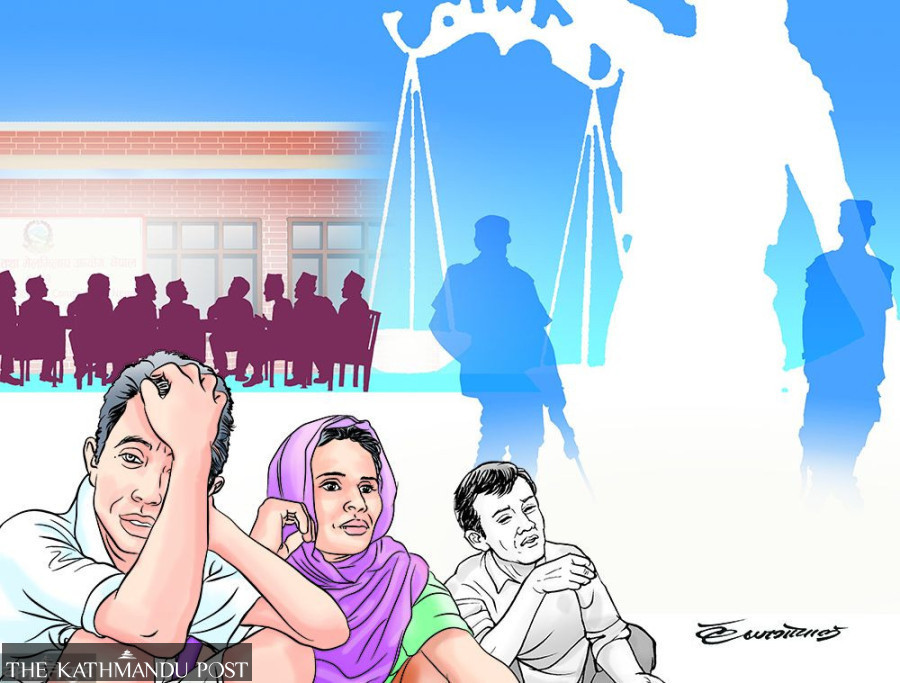National
Police start inquiries about missing kin, families claim
Conflict victims’ rights advocates, relatives object to interrogations while two commissions stay idle.
Binod Ghimire
At a time when the transitional justice commissions have been defunct for more than two years, Nepal Police has started inquiries about the victims of enforced disappearance, their family members say.
On Monday, a police team from Lalitpur visited the houses of such victims in the Thecho area where they asked the families if the missing persons had returned or if they had established any contacts. The team also reached Nagma Mali’s house to inquire about the whereabouts of her father. Nandagopal Mali, who was arrested by the security forces, has been missing since June 22, 2004.
“I was not home when the police arrived. Later they called to ask if I had any updates on my father," she told the Post. "It came as a shock and I suspect the police have taken up the issue as the transitional justice commissions remain defunct. It is a worrying sign if true."
Victims’ rights advocates say the police who went door to door on Monday claimed to have received a circular from the Police Headquarters to study the situation.
"The victims have reported that the police who visited their place said they were doing their job as directed by the central office," Suman Adhikari, founding chairperson of the Conflict Victims Common Platform, told the Post. "What is the government trying to do by mobilising the security agency to look into war-era cases while keeping the transitional justice commissions defunct?”
The Truth and Reconciliation Commission and the Commission for the Investigation of Enforced Disappeared Persons (CIEDP) have been paralysed since July 2022, after the government decided to extend their terms without retaining their chairmen and members. The CIEDP has the responsibility to investigate the cases of enforced disappearances.
Against the government’s claim that the bill to amend the Enforced Disappearances Enquiry, Truth and Reconciliation Commission Act would be endorsed by October 2022 and open the door for recruiting new office bearers, there has been no progress even after two years. The government has already given four extensions to the two commissions in two years.
Through its last Cabinet meeting, the Pushpa Kamal Dahal government on July 19 extended their terms by another year. However, it is still unsure when the Act gets amended and the defunct commissions get their office bearers. The government employees deployed to the commissions lack authority to conduct works other than day-to-day administration.
The Dahal government on April 12 had formed a committee to recommend the office bearers for the two commissions. However, it is yet to hold its first meeting as the National Human Rights Commission has refused to send its representatives until there is commitment from the government and the political parties to endorse the amendment.
“Rather than using intimidation tactics by mobilising the police, the government should work towards a proper revision in the Act and ensuring that the two commissions become functional,” said Adhikari.
Nepal Police, however, denied having issued any such circular recently. “Finding the missing persons is our job, which we always do. However, there has been no circular to subordinate offices to carry out inquiries targeting the missing people from the conflict time,”Dan Bahadur Karki, the Nepal Police spokesperson, told the Post. “There are separate commissions to look into these matters.”
The commissions were formed in February 2015 with a two-year deadline to investigate cases of atrocities committed during the war. But nine years since, their terms have been extended for around 10 times without any tangible results.
The commission on disappearances got a total of 3,223 complaints. However, it has shortlisted only 2,506 cases for investigation after a study that the other complaints did not fall within its jurisdiction.




 18.12°C Kathmandu
18.12°C Kathmandu














